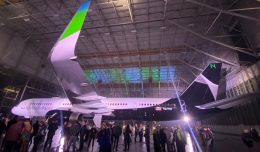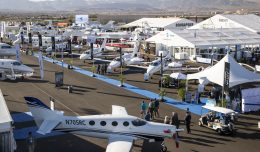“HIDDEN TAX SALE. Fare from only? $?.?? Based on whatever the government feels like doing,” boasted Spirit Airlines’ home page last Thursday. A new rule requiring airlines to advertise the full price paid for airline tickets, including all applicable taxes and fees, from the US Department of Transportation went into effect the same day.
Pretty straight forward, right? No longer will you see a billboard by the freeway or a tweet from an airline advertising $29 one-way fares only to be surprised that the actual price is something more like $50 for your preferred $29 flight.
“[It] makes purchasing travel sensible, like purchasing stuff in Europe: the amount on the price tag is what you pay,” wrote Jason Cochran, an award winning travel writer, about the new rule on his blog.
US airlines do not agree. Allegiant Airlines, American Airlines, Continental Airlines, Delta Air Lines, Southwest Airlines, Spirit Airlines, United Airlines and US Airways all filed comments opposing the new rule with the DOT. Claims ranged from the basic premise that advertising fares without including taxes and fees allows for full cost transparency, is in line with the marketing practices of other consumer goods sectors in the US and that by stating the full price disclosure of the actual costs associated with flights is suppressed by the government.
Consumers and consumer rights organisations support the changes. The Business Travel Coalition and Consumer Travel Alliance filed a joint comment that claimed that previous airline advertising practices allowed them to “offer the spectre of lower airfares in order to gain enhanced positioning on internet displays while aggressively increasing and hiding ancillary fees,” with the DOT. The federal agency cited consumers who commented that the advertising practices of airlines “borders on bait-and-switch tactics,” in its final rule announcement in the Federal Register on 25 April 2011.
The DOT found that the new rule was in the public interest. This was based on the fact that consumers felt deceived when total price did not include taxes and fees, that airfares are different from products in other industries due to the numerous marketing methods used, and that the new rule does nothing to prohibit airlines from breaking out taxes and fees for travellers. The rule also included a mandatory 24-hour refund period for tickets bought more than a week before departure, new delay notification requirements and expands tarmac delay penalties to foreign carriers. It went into effect after a nine-month and one day implementation period – significantly longer than the initial 180 days – on 26 January.
Spirit began its campaign to swing public opinion against the action the same day. The airline launched an online campaign asking consumers to contact their congressional representatives to rescind the rule at keepmyfareslow.com. It is also a joint plaintiff with Allegiant and Southwest in a pending lawsuit to stop the rule in the U.S. Court of Appeals for the District of Columbia.
“We believe that the better form of transparency is to break out costs so customers know exactly what they are buying,” said Ben Baldanza, chief executive of Spirit, in a statement. “If the government can hide taxes in consumer’s airfares – which they are mandating us to do starting this week – then they can quietly carry out their hidden agenda and increase the taxes consumers bear.” A spokesperson for Spirit declined further comment.
Baldanza’s statement makes no sense. A reading of the final rule by NYCAviation found no instances where airlines are forbidden from breaking out taxes and fees for customers to view during booking. The decision is left completely up to the airline to provide an itemized list of charges.
“[The rule] allows carriers to advise the public in their fare solicitations about government taxes and fees, or other mandatory carrier or ticket agent imposed charges applicable to their airfares,” wrote the DOT in the Federal Register.
Travellers should be sceptical of Spirit’s claims. The airline is known for its $9 one-way sales that, after taxes and fees – including airline specific $10 booking and up to $16.99 passenger usage fees – can come out to significantly more than the advertised price. This does not include the carry-on bag fee ($30 at booking) or checked bag fee ($28 for the first bag) and pre-selected assigned seat fee ($1 to $50 per standard seat or $12 to $199 for a “big front seat”) for a domestic flight booked online. Forget to check-in online? That’s another $2 at a kiosk or $5 at an agent per boarding pass.
The DOT fined Spirit for deceptive price advertising this past November. It cited instances where the airline did not include the amount of additional taxes and fees in fine print on billboards and where it advertised a $9 fare on Twitter that required a buyer to click on at least two links before the additional charges were disclosed for the $50,000 levy.
“I have been shocked by the failure of your airline to tell the truth,” wrote California senator Barbara Boxer in a letter to Baldanza responding to the airline’s online campaign against the new rule dated January 26. “What the rule says is that you have to tell your customers the full cost of a ticket.”
The rule has no connection with the government’s ability to increase fees, as Baldanza argued. Yes, president Barack Obama has proposed a new $100 per flight surcharge on commercial airliners and an initial increase to $5 from $2.50 of the passenger security fee to partially fund Federal Aviation Administration programmes and the Transportation Security Administration. Spirit – and pretty much every other major airline in the US – is against the idea. But including all taxes and fees in an advertised ticket price has no bearing on whether or not the president’s proposal will (or should) be approved by congress, which itself is an increasingly doubtful proposition with the current anti-tax increases congress and during an election year.
No other US airline is going to the same lengths as Spirit. Despite also opposing the rule, only Alaska Airlines and Southwest’s home pages included an obvious mention of the change. Even Allegiant and Southwest, who are joint plaintiffs on the pending lawsuit to get the rule rescinded, have not launched similar campaigns aimed at raising a public outcry against it.
Consumers should decide for themselves what makes sense. Do they want to be tempted by ads for $9 fares when the price is probably at least $30 more expensive or an ad that states the full price from the beginning? I can’t speak for others but $40 one-way plane tickets still sound pretty good to me.
Edward Russell is a financial journalist and airline enthusiast based in New York. The son of a pilot, he’s been spotting and collecting airline memorabilia since a young age and has been writing about airlines in the US and Asia since 2006. Follow him on Twitter @e_russell.







